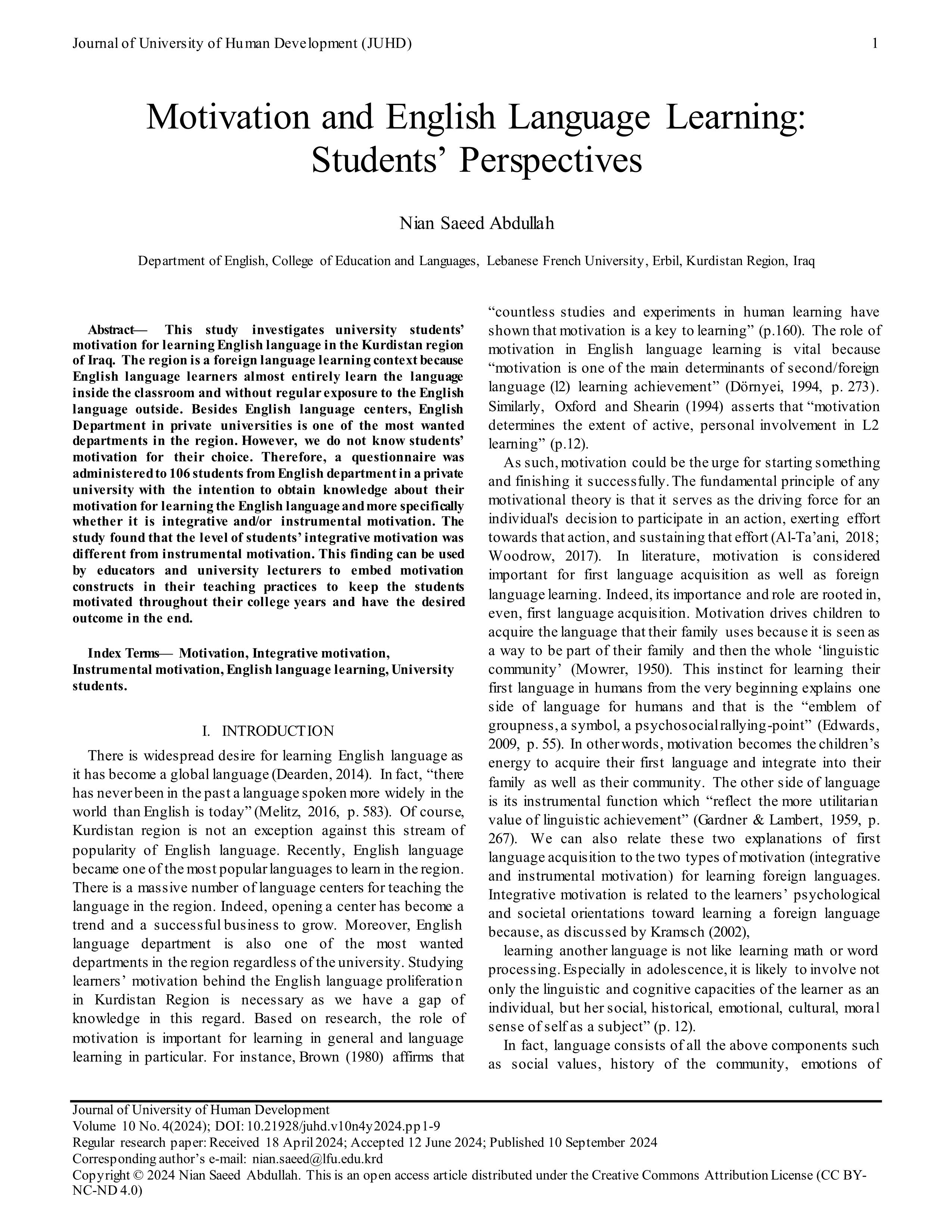Motivation and English Language Learning: Students’ Perspectives
DOI:
https://doi.org/10.21928/juhd.v10n4y2024.pp1-9Keywords:
Motivation, Integrative motivation, Instrumental motivation, English language learning, University studentsAbstract
This study investigates university students’ motivation for learning English language in the Kurdistan region of Iraq. The region is a foreign language learning context because English language learners almost entirely learn the language inside the classroom and without regular exposure to the English language outside. Besides English language centers, English Department in private universities is one of the most wanted departments in the region. However, we do not know students’ motivation for their choice. Therefore, a questionnaire was administered to 106 students from English department in a private university with the intention to obtain knowledge about their motivation for learning the English language and more specifically whether it is integrative and/or instrumental motivation. The study found that the level of students’ integrative motivation was different from instrumental motivation. This finding can be used by educators and university lecturers to embed motivation constructs in their teaching practices to keep the students motivated throughout their college years and have the desired outcome in the end.
References
Al-Ta’ani, M. H. (2018). Integrative and instrumental motivations for learning English as a university requirement among undergraduate students at Al-Jazeera University/Dubai. International Journal of Learning and Development, 8(4), 89-105. doi:10.5296/ijld.v8i4.13940.
Babbie, E. R. (2020). The practice of social research. Massachusetts: Wadsworth Publishing.
Bećirović, S. (2017). The relationship between
gender, motivation and achievement in learning English as a foreign language. European Journal of Contemporary Education, 6(2), 210-220. DOI: 10.13187/ejced.2017.2.210
Bernaus, M., & Gardner, R. C. (2008). Teacher motivation strategies, student perceptions,
student motivation, and English achievement. The Modern Language Journal, 92(3), 387-401. https://doi.org/10.1111/j.1540-4781.2008.00753.x.
Best, J. W. (1977). Research in education (5th ed.). Englewood Cliffs, New Jersey: Prentice Hall.
Brown, H. D. (1980). Principles of Language Learning and Teaching (4th ed.). NY: Addison Wesley Longman, Inc.
Chalak, A., & Kassaian, Z. (2010). Motivation and attitudes of Iranian undergraduate EFL students towards learning English. GEMA online journal of language studies, 10(2), 37-56. https://core.ac.uk/reader/11491400.
Dearden, J. (2014). English as a medium of instruction-a growing global phenomenon. British Council.https://www.britishcouncil.es/sites/default/files/british_council_english_as_a_medium_of_instruction.pdf.
Degang, M., (2010). Motivation toward English Language Learning of the Second Year Undergraduate Thai Students Majoring in Business English at an English–Medium University. Srinakharinwirot University, Bangkok, Thailand.
Dörnyei, Z. (1990). Conceptualizing motivation in foreign‐language learning. Language learning, 40(1), 45-78. https://doi.org/10.1111/j.1467-1770.1990.tb00954.x.
Dörnyei, Z. (1994). Motivation and motivating in the foreign language classroom. The modern language journal, 78(3), 273-284. https://doi.org/10.2307/330107.
Dörnyei, Z. (1997). Motivational factors in second language attainment: A review of research in Hungary. Acta Linguistica Hungarica, 261-275. http://real- j.mtak.hu/848/1/ACTALINGV_44.pdf#page=265.
Dornyei, Z (2006). The L2 motivational self system.
In Z, Dörnyei & E. Ushioda (Eds.) Motivation, Language Identity and the L2 Self (pp. 9-42). Bristol: Channel View Publications.
Dörnyei, Z. (2019). From integrative motivation to directed motivational currents: The evolution of the understanding of L2 motivation over three decades. In M. Lamb, K. Csizér, A. Henry & S. Ryan (Eds.) The Palgrave Handbook of Motivation for Language Learning (pp. 39-69). Cham: Springer Nature Switzerland AG.
Edwards, J. (2009). Language and identity: An introduction. Cambridge: Cambridge University Press.
Gardner, R.C. (1985a). Social psychology and second-language learning: The role of attitudes and motivation. London, England: Edward Arnold.
Gardner, R. C. (1985b). The Attitude/Motivation Test Battery: Technical Report (Report No. 10). Language Research Group: University of Western Ontario. https://publish.uwo.ca/~gardner/docs/AMTBmanual.pdf
Gardner, R. C., & Lambert, W. E. (1959). Motivational variables in second-language acquisition. Canadian Journal of Psychology / Revue canadienne de psychologie, 13(4), 266–272. https://doi.org/10.1037/h0083787.
Gardner, R. C. Smythe, P. C. Clement, R. and Gliksman, L. (1976). Second language acquisition: A social psychological perspective. Canadian Modern Language Review, 32, 198-213. https://www.researchgate.net/publication/285494708.
Van der Helm, R. (2009). The vision phenomenon: Towards a theoretical underpinning of visions of the future and the process of envisioning. Futures, 41(2), 96-104.
Jin, M., (2014). A Case Study of Non-English Major College Students’ Motivation in English Language Learning. Open Journal of Modern Linguistics, 4, 252-259. DOI:10.4236/ojml.2014.42020
Kramsch, C. (2002). Beyond the second vs. foreign language dichotomy: The subjective dimensions of language learning. In K. S. Miller & P. Thompson (Eds.) Unity and diversity in language use (pp. 1-21). London: Biddies Ltd.
Lamb, M. (2004). Integrative motivation in a globalizing world. System, 32(1), 3-19. https://doi.org/10.1016/j.system.2003.04.002.
Lamb, M., Csizér, K., Henry, A., & Ryan, S. (2019). Introduction. In M. Lamb, K. Csizér, A. Henry, & S. Ryan (Eds.) The Palgrave Handbook of Motivation for Language Learning (pp. 1-17). Cham: Springer Nature Switzerland AG.
Mowrer, O. H. (1950). Learning theory and personality dynamics. New York: Ronald Press.
Melitz, J. (2016). English as a Global Language. In V. Ginsburgh and S. Weber (Eds.) The Palgrave Handbook of Economics and Language (pp. 583-615). London: Palgrave Macmillan UK. https://papers.ssrn.com/sol3/papers.cfm?abstract_id=2501575.
Nguyen, H. C. (2019). Motivation in learning English language: a case study at Vietnam national university, Hanoi. European Journal of Educational Sciences, 6(1), 49-65. Doi: 10.19044/ejes.v6no1a4.
Oxford, R. & Shearin, J. (1994) Language learning motivation: Expanding the theoretical framework. The Modern Language Journal, 78(1), 12-28. https://doi.org/10.2307/329249.
Sulaiman, M. S. A., & Mousa, S. M. (2019). Evaluation of academic motivation, a case study of English department students at Duhok University. Journal of Duhok University, 22(2), 325-334.
Woodrow, L. (2017). Motivation in Language Learning. In R. Breeze & C. S. Guinda (Eds.). Essential Competencies for English-medium University Teaching (pp. 235-248). Springer International Publishing. DOI:10.1007/978-3-319-40956-6_16.

Downloads
Published
How to Cite
Issue
Section
License
Copyright (c) 2024 Nian Saeed Abdullah

This work is licensed under a Creative Commons Attribution-NonCommercial-NoDerivatives 4.0 International License.


